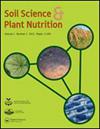Application of phosphate solubilizing fungi and lime altered the soil inorganic phosphorus fractions in an Ultisol of north-eastern India
IF 1.8
4区 农林科学
Q3 ENVIRONMENTAL SCIENCES
引用次数: 2
Abstract
ABSTRACT The gradually dwindling reserves of rock phosphate, the primary material used in the manufacturing of phosphatic fertilizers, encourages researchers to look for ways to exploit the accumulated fixed P pool in soil. Phosphate solubilizing microorganisms (PSM) could be a viable option for addressing the problem at a lower cost. Keeping these in mind, the present study was undertaken to evaluate the changes in the distribution of P in soil as affected by P fertilization, phosphate solubilizing fungi (PSF) and liming vis-à-vis the contribution of these fractions toward P nutrition of a test crop soybean (Glycine max L.). A bulk surface soil sample (0–15 cm) was obtained from Negheriting tea estate of Golaghat district of Assam, India (Ultisol, pH = 4.23) and after processing, three levels of P [0, 50, and 100% of recommended dose of P (RDP)], two levels of lime [No lime, 1/10th of Lime Requirement (LR)] and two levels of PSF (No-PSF, PSF) were applied in a completely randomized design with three replications. Sequential P fractionation was done in the post-harvest soil. On an average, the abundance of different P fractions in the soil, expressed as % of total P, followed the order: residual P (67.5%)> Fe bound P (12.1%)> reductant soluble P (8.85%)> Al bound P (4.04%)> occluded P (3.79%)> Ca bound P (3.11%)> soluble and loosely bound P (0.46%). All the inorganic P fractions except the residual P, increased significantly with P fertilization. Either liming or PSF application significantly increased the soluble and loosely bound P fraction and decreased the Al bound and Fe bound P fractions in soil. Positive growth response of soybean was obtained due to the application of P, lime, and PSF. Liming increased the P uptake by 30.4% and dry matter yield of soybean by 18.5% over no liming. On the other hand, PSF inoculation increased the P uptake by 16.7% and dry matter yield by 7.77% over no inoculation. So, it is evident that in short term, either liming or PSF was able to solubilize the native soil P. Phosphorus×lime and lime×PSF interactions should also be exploited in future endeavors.磷增溶真菌和石灰的施用改变了印度东北部土壤中无机磷的组分
作为制造磷肥的主要原料,磷矿的储量逐渐减少,促使研究人员寻找开发利用土壤中积累的固定磷库的方法。磷酸盐增溶微生物(PSM)可能是一个可行的选择,以较低的成本解决问题。考虑到这些因素,本研究评估了施磷肥、增磷真菌(PSF)和石灰对土壤中磷的分布的影响,并考察了这些组分对试验作物大豆(Glycine max L.)磷营养的贡献。从印度阿萨姆邦Golaghat地区的Negheriting茶园(Ultisol, pH = 4.23)获得了一份0 - 15 cm的土壤样品,处理后,采用完全随机设计,采用3个重复,施用3个水平的P[0、50和100%的P推荐剂量(RDP)], 2个水平的石灰[无石灰,需石灰量(LR)的1/10]和2个水平的PSF(无PSF, PSF)。在收获后土壤中进行序贯磷分馏。平均而言,土壤中不同磷组分的丰度(以占全磷的百分比表示)顺序为:残余磷(67.5%)>铁结合磷(12.1%)>还原剂可溶性磷(8.85%)>铝结合磷(4.04%)>封闭磷(3.79%)>钙结合磷(3.11%)>可溶性和松散结合磷(0.46%)。除残余磷外,其余无机磷组分均随施磷量的增加而显著增加。施用石灰和磷肥均能显著提高土壤中可溶磷和松散结合磷的含量,降低土壤中铝结合磷和铁结合磷的含量。施磷肥、石灰和聚磷肥对大豆的生长有良好的响应。施用石灰比不施用石灰提高了大豆吸磷量30.4%,干物质产量提高了18.5%。另一方面,与未接种相比,接种PSF增加了16.7%的磷吸收量和7.77%的干物质产量。因此,很明显,在短期内,石灰或PSF都能溶解原生土壤P. Phosphorus×lime和lime×PSF的相互作用也应该在未来的努力中加以利用。
本文章由计算机程序翻译,如有差异,请以英文原文为准。
求助全文
约1分钟内获得全文
求助全文
来源期刊

Soil Science and Plant Nutrition
农林科学-农艺学
CiteScore
4.80
自引率
15.00%
发文量
56
审稿时长
18-36 weeks
期刊介绍:
Soil Science and Plant Nutrition is the official English journal of the Japanese Society of Soil Science and Plant Nutrition (JSSSPN), and publishes original research and reviews in soil physics, chemistry and mineralogy; soil biology; plant nutrition; soil genesis, classification and survey; soil fertility; fertilizers and soil amendments; environment; socio cultural soil science. The Journal publishes full length papers, short papers, and reviews.
 求助内容:
求助内容: 应助结果提醒方式:
应助结果提醒方式:


